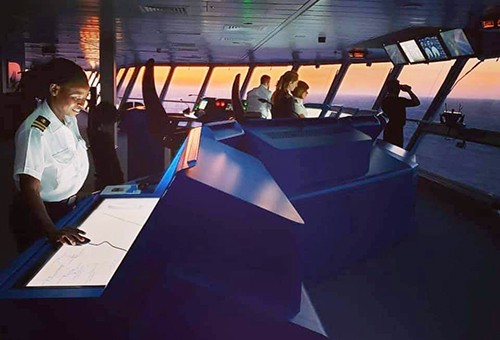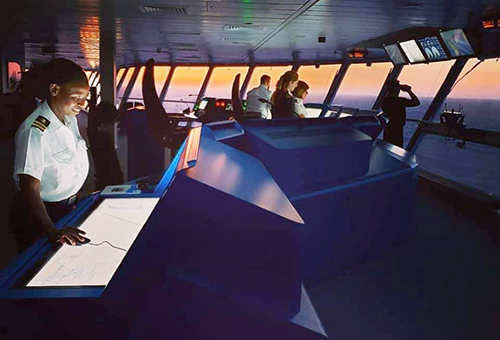2024年世界海事主题:“Navigating the future: safety first!”
发表于 2023-07-28 15:45
▲"Navigating the future: safety first!" has been selected for the International Maritime Organization's 2024 World Maritime Theme.
新技术和替代燃料时代的海事安全是国际海事组织2024年世界海事主题的核心。
“领航未来:安全第一!”被选为国际海事组织2024年世界海事主题,该主题将在2024年9月26日庆祝世界海事日时达到高潮。
该主题反映了国际海事组织在保护海洋环境的同时加强海上安全和安保的工作,同时确保其监管发展进程安全地预见到技术变革和创新的快速步伐。
国际海事组织秘书长林基泽说:
“这一主题将使我们能够专注于新技术和适应技术以及替代燃料的引入所产生的全方位安全监管影响,包括减少船舶温室气体排放的措施,因为国际海事组织努力确保航运的安全和效率得到维持,并可能得到改善,从而使海运国际贸易的流动继续保持平稳和高效。”
自1948年海事组织成立以来,安全一直是该组织所有活动的核心。随着差距日益明显,以及国际海事组织积极主动地预测适应新兴技术和创新所需的变化,监管框架正在不断发展,一个突出的例子是目前正在进行的基于目标的海上自主水面船舶规则(MASS Code)的开发。
2024年是1974年《国际海上人命安全公约》(SOLAS Convention)通过50周年,该公约是国际海事组织规范海上安全的关键条约。
数字化和自动化通过引入新技术,增强安全、安保和效率,优化性能,减少环境影响,确保可持续性,正在日益彻底改变航运业。
这提高了航运业的整体效率和竞争力,使船舶的设计、建造和运营更加高效,处理更多货物,降低成本,提高客户满意度成为可能。
海运运输约占全球贸易的90%,是对环境破坏最小的运输方式。很明显,提高船舶安全性和减少温室气体(GHG)排放是齐头并进的——两者对于实现可持续和高效的海运业至关重要。
“领航未来:安全第一!”的主题促进了国际海事组织雄心勃勃的加速温室气体减排政策,其中包括对引入新技术和适应技术及替代燃料所带来的安全风险进行评估,以及制定监管措施以解决并最终减轻这些风险。
该主题还与《联合国2030年可持续发展议程》和若干联合国可持续发展目标密切相关,特别是
可持续发展目标7:通过促进获得清洁能源研究和技术,确保获得负担得起的、可靠的、可持续的现代能源;
可持续发展目标8:促进持续、包容和可持续的经济增长、充分和生产性就业以及人人享有体面工作;
可持续发展目标9:建设有弹性的基础设施,促进包容性和可持续的工业化,促进创新;
可持续发展目标13:采取紧急行动应对气候变化及其影响;
以及可持续发展目标14:关于保护和可持续利用海洋和海洋资源促进可持续发展。
海事组织理事会第129届会议根据海事组织秘书长林基泽的提议核可了这一主题。
英文原文
Maritime safety in an era of new technologies and alternative fuels central to IMO World Maritime Theme for 2024.
"Navigating the future: safety first!" has been selected for the International Maritime Organization's 2024 World Maritime Theme, which will culminate in the celebration of World Maritime Day on 26 September 2024.
The theme reflects IMO's work to enhance maritime safety and security, in tandem with the protection of the marine environment, whilst ensuring its regulatory development process safely anticipates the fast pace of technological change and innovation.
IMO Secretary-General Kitack Lim said:
"This theme would allow us to focus on the full range of safety regulatory implications arising from new and adapted technologies and the introduction of alternative fuels including measures to reduce GHG emissions from ships as IMO strives to ensure the safety and efficiency of shipping are maintained, and potentially improved, so that the flow of seaborne international trade continues to be smooth and efficient."
Safety has been at the heart of all of IMO's activities since the Organization was established in 1948. The regulatory framework is continuously evolving as gaps become apparent and as a result of IMO's proactive work to anticipate changes needed to accommodate emerging technologies and innovation – a prominent example being the currently ongoing development of a goal-based Code for maritime autonomous su***ce ships (MASS Code).
2024 marks 50 years since the adoption of the 1974 SOLAS Convention, the key IMO treaty regulating maritime safety.
Digitalization and automation are increasingly revolutionizing the shipping industry by introducing new technologies that enhance safety, security and efficiency, optimize performance, reduce environmental impact and ensure sustainability.
This is improving the overall efficacy and competitiveness of the shipping industry, making it possible to design, construct and operate ships more efficiently, handle more cargo, reduce costs and enhance customer satisfaction.
Shipping transports about 90% of global trade and is the least environmentally damaging mode of transport. It is manifestly obvious that improving the safety of ships and reducing their greenhouse gas (GHG) emissions go hand in hand – both are critical to achieving a sustainable and efficient maritime industry. The theme "Navigating the future: safety first!" promotes IMO's ambitious and accelerated GHG reduction policy which includes the assessment of safety risks, that come with the introduction of new and adapted technologies and alternative fuels, and the development of regulatory measures to address and ultimately mitigate those risks.
The theme is also closely linked to the UN 2030 Agenda for Sustainable Development and several of the UN's Sustainable Development Goals (SDGs), particularly SDG 7 on ensuring access to affordable, reliable, sustainable and modern energy by facilitating access to clean energy research and technology; SDG 8 on promoting sustained, inclusive and sustainable economic growth, full and productive employment and decent work for all; SDG 9 on building resilient infrastructure, promoting inclusive and sustainable industrialization and fostering innovation; SDG 13 on taking urgent action to combat climate change and its impacts; and SDG 14 on conserving and sustainably using the oceans, seas and marine resources for sustainable development.
The IMO Council, meeting for its 129th session, endorsed the theme following a proposal by IMO Secretary-General Kitack Lim.
免责申明:本文来自IMO,如有误差,以英文为准;仅代表作者观点,不代表中国海员之家立场。其真实性及原创性未能得到中国海员之家证实,在此感谢原作者的辛苦创作,如转载涉及版权等问题,请作者与我们联系,我们将在第一时间处理,谢谢!联系邮箱:cnisu@54seaman.com


 联系我们人工客服
联系我们人工客服



















 :1391995811
:1391995811


评论 (0人参与)